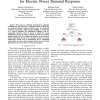Free Online Productivity Tools
i2Speak
i2Symbol
i2OCR
iTex2Img
iWeb2Print
iWeb2Shot
i2Type
iPdf2Split
iPdf2Merge
i2Bopomofo
i2Arabic
i2Style
i2Image
i2PDF
iLatex2Rtf
Sci2ools
105
click to vote
CDC
2010
IEEE
2010
IEEE
Market-based control mechanisms for electric power demand response
We propose a settlement mechanism for optimally scheduling real time electricity consumption which is suitable for an automated demand response control system. Our proposed settlement mechanism, supply function bidding, is interpreted as a Newton algorithm for optimization problems with decomposable structure, and it is shown to satisfy the second fundamental theorem of welfare economics for the case of affine supply function bids. We simulate the behavior of our proposed control mechanism for the case of demand response via room temperature control, and we demonstrate how a suboptimal control policy can have adverse impacts both in terms of system performance but also in terms of economic incentives.
| Added | 13 May 2011 |
| Updated | 13 May 2011 |
| Type | Journal |
| Year | 2010 |
| Where | CDC |
| Authors | Anthony Papavasiliou, Haitham Hindi, Daniel Greene |
Comments (0)

